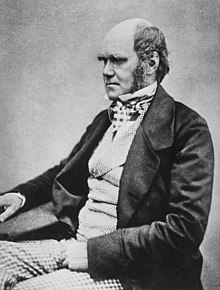 |
| Charles Darwin - whose theory of evolution has influenced psychology |
My approach to self-directed behaviours is largely influenced by Charles Darwin whose theory of evolution focuses on natural selection and sexual selection. Natural selection relates to how well organisms are adapted to their environment in terms of being able to obtain food, fend off predators, develop immunity to diseases and grow to adulthood. Sexual selection is how well organisms can attract mates and produce offspring. The two things are separate but inter-related.
A darwinian approach to medicine aims to see whether strange behaviours or mental states have positive benefits. For example, having a high temperature is the body's response to fighting off invading viruses - contrary to popular belief which sees the high temperature as caused by the virus. Invading micoorganisms cannot breed as quickly when the body is hotter. Of course, the danger is that a temperature that goes too high can be life threatening also. Or take vomiting - it is the body's way of ridding the gut of harmful contents and so has a beneficial function.
Similarly, Darwinian psychiatry aims at understanding the potential benefits of behaviours and mental states commonly viewed as harmful or a problem to be cured. Let's take hair pulling for our example. It can be viewed not as an adaptive action (one that promotes growth and well-being) but a maladaptive one. A maladaptive behaviour is one that is manifested in an unnatural environment (e.g. a cage) and helps the organism cope better with its unnatural environment. It may help lower stress levels but at the cost of hair or fur loss (i.e. bald patches) - but the point is that it is not all bad.
Viewing seemingly negative behaviours in this way stands the common wisdom on its head. Rather than being behaviours that are bad for you and damaging, they instead may make you feel better whilst you are engaged in them. Hair pullers positively enjoy yanking hairs and obtaining roots. It is only the guilt and shame that follows brings them down.
Another example is self-harming. People may cut themselves or scratch at their skin and this is commonly seen as an act of self directed aggression. But from a Darwinian viewpoint the self-infliction of pain may lead to dopamine release in the brain and from this the self-harmer can feel uplifted and elated. This is not as contradictory as it may seem. For thousands of years humans had to cope with injuries without anaesthetic, surgery or doctors. The body developed mechanisms whereby pain at a certain level either leads to unconsciousness or can lead to endorphins (natural painkillers in the body) being released. These endorphins are extremely powerful natural drugs and would have helped our ancestors keep moving despite their injuries.
Applying a Darwinian approach to psychology is long overdue and much needed if we are to make real sense of, and truly understand the reason we develop the behaviours we do.
No comments:
Post a Comment
Please leave your comment below: